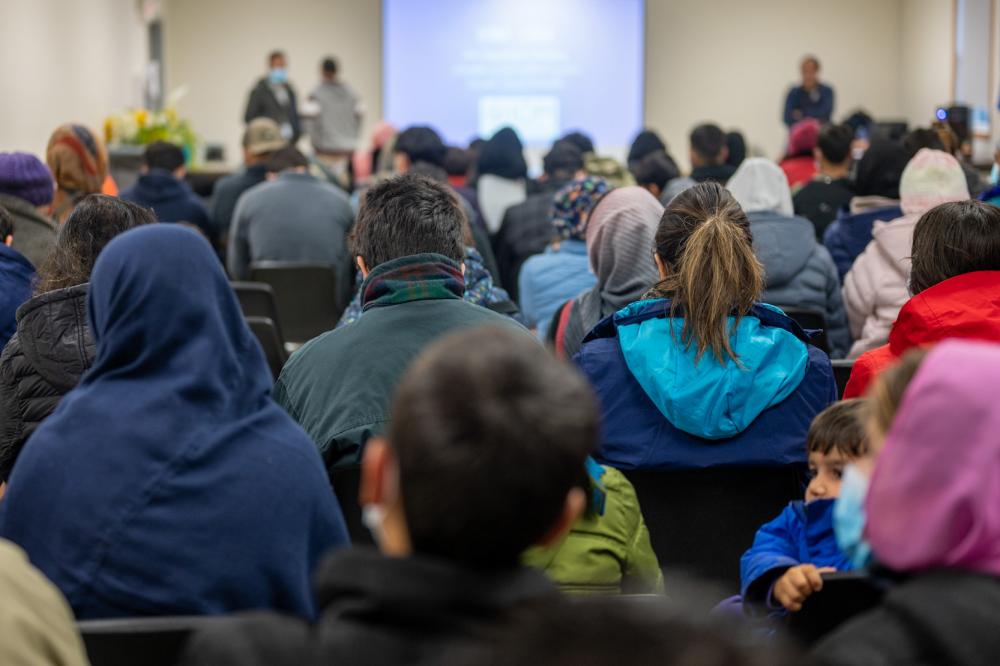Former National Security Advisor Michael Flynn plead guilty to lying to the FBI and will now cooperate with an ongoing investigation into Russian campaign interference. We take a close look at Flynn’s case and where the probe goes from here. We also discuss what’s at stake during a new session of trials at the International Criminal Court. Plus, WPR Director Mike Crane is in to talk about the latest in programming and answer your questions.
Featured in this Show
-
What's Next After Flynn Pleaded Guilty To Lying To Investigators?
The president’s former national security advisor, Michael Flynn, pleaded guilty to lying to the FBI about meeting with a Russian official on Friday. As part of the plea agreement, Flynn agreed to further cooperate with investigators. We talk to a former federal prosecutor and law professor about the legal implications of the charges against Flynn.
-
Recent Verdicts And Future Inquiries By The International Criminal Court
Former Bosnian Serb general Ratko Mladić was recently found guilty of committing war crimes, crimes against humanity, and genocide by the International Criminal Tribunal for the former Yugoslavia. The same court also sentenced Bosnian Croat General Slobodan Praljak, who killed himself by ingesting poison smuggled into the courtroom.
The only journalist to cover all contemporary war crimes tribunals shares what the end of the trials into war crimes in the former Yugoslavia means. He also explains where the International Criminal Court might next turn its attention, including the possibility that American soldiers could be part of an inquiry on war crimes committed in Afghanistan.
-
Mondays With Mike–Holiday And Special Programming On WPR
WPR Director Mike Crane joins the show for a look at the latest news from WPR, including upcoming special and holiday programming. He’ll also address the future of A Prairie Home Companion. And he’s happy to take your questions and comments as well.
What questions do you have about programming or news coverage on Wisconsin Public Radio? What do you want to hear more … or less of on WPR? What do you want to know about WPR’s budget or financial operations?
Let us know by emailing ideas@wpr.org
You can also contact us here:
Tweet: @centraltimewpr
Facebook: https://www.facebook.com/theideasnetwork/Call during showtime: 1-800-642-1234
-
A Journalist's Reflections On Covering War Crimes Trials
Thierry Cruvellier is the only journalist in the world who has attended and reported on all of the major post-Cold War International Criminal Court tribunals, including Rwanda, Sierra Leone, Bosnia and Cambodia, as well as national justice efforts in Colombia and the Balkans.

He is a visiting professor at the University of Wisconsin-Madison this year, teaching a course on international criminal justice. He has written books on the Rwanda and Cambodia trials, and is set to publish a book on Sierra Leone in 2018.
We wanted to know how a human being can spend two decades faced with the worst of human nature and behavior, and try to make sense of how some individuals can commit such heinous acts, and how the victims and survivors can emerge from the horrors they experience.
This interview has been edited for brevity and clarity.
Judith Siers-Poisson: You are the only journalist to have attended trials brought before all contemporary international tribunals for war crimes and crimes against humanity. What is it like to attend those trials day after day, year after year?
Thierry Cruvellier: It’s exhausting, and it’s fascinating too. The reason you keep doing it is that war crimes trials offer an incredible opportunity to actually grasp an extraordinary event, and what happened to an entire society, to an entire country, in a sort of manageable way because you deal with the individual story of a person. It’s very presumptuous to embrace the history of a country that is usually not yours, and by dealing with the individual story of a particular individual and particular facts it sort of makes it manageable.
War crimes trials are also incredibly rich territory for a reporter or for a writer. You have an incredible range of characters that you can work on, from opportunist lawyers, to idealistic human rights activists, from farmers, to ministers as witnesses. And of course the drama is guaranteed. There is always the future and the life of an individual at stake and there’s always the pain and the suffering of a whole community in play.
A war crimes trial is interesting in many, many different ways. You can look at it on a legal point of view, but you can also look at it as a historical event, as a political event, as an international relations issue, or with a psychological or philosophical dimension.
Of course the downside is that it doesn’t fill your brain with a lot of positive stuff.
JSP: So sitting there listening to witnesses, survivors, or maybe the defendants themselves, recounting these atrocities, how do you protect yourself mentally and emotionally to be able to continue doing that work and not be paralyzed by that secondary trauma?
TC: In my experience when you cover a truth commission, it’s much more demanding. That’s not a trial, it’s more like a sort of commission of inquiry with public hearings where the victim is at the center of all of it. And it’s actually much harder to keep at it for a long time as a reporter because the exposure to the direct suffering is without the filter.

In a courtroom there is the whole legal decorum that sort of helps put a distance between what we are talking about and what we really hear. So I think that helps a lot. Also, it’s a disrupted process. We have a lot of breaks. And I also think the writing is very important. In your own process by writing, especially if you report on a very daily basis, it’s a way to take it out of your system … So I think that helps you in the long run to stay for a while.
But you always reach a limit. There’s always a moment where you actually took too much in and then you realize that it took a toll on you. There’s no way you can do this work over a long period without consequences. So you have to live with it and you have to accept that this is what comes with this work.
There’s nothing to be proud of — it’s just the way it is and it’s a choice. Nobody has forced me to do it. So if it comes with consequences that’s it. It’s part of the work.
JSP: Is there a survivor story that has stayed with you more than others?
TC: It’s hard to tell. There are voices that I can suddenly think about and remember more vividly than others. You never really know exactly why. But somehow, at that moment, that voice and that particular way of telling the story is going to leave a stronger mark on you.
I’m not sure that I can tell you exactly what is it that made that particular voice more significant to you. Maybe there’s a level of sincerity at that moment, with that person that you feel that makes it even more moving, victims who convey the sense of complexity of who we are as human beings. So maybe those who stay with you are coming with a lot of suffering, a lot of pain, but are able to understand that our human nature is complicated and ambiguous, including the one of the accused.
JSP: After 20 years of covering these trials and seeing the humanity not just in the victims and survivors, but often at least the hidden humanity in the accused, how do you view the human race now?

TC: Do you mean how do you remain optimistic? I think you definitely come out of it with a sense that it tells us a lot about ourselves. I also think that’s why keeping on working on these crimes makes sense.
And yes, you end up realizing that even though the perpetrators have committed monstrous acts, they’re not the easy monsters that we would like them to be. Very often when it comes to these kind of crimes, they are actually people who were not criminals before and won’t be after these exceptional circumstances in which they were part of a mass crime. And that is very important for me to keep that in mind because they are no different than I am, and they are no different than we are.
So, you do probably come out with a more complicated, or less safe philosophy of life, but perhaps one that is much closer to what I think the reality of our human species is.
Listen here for more of Judith Siers-Poisson’s interview with Thierry Cruvellier.
Episode Credits
- Rob Ferrett Host
- Judith Siers-Poisson Host
- Haleema Shah Producer
- Judith Siers-Poisson Producer
- Frank Tuerkheimer Guest
- Thierry Cruvellier Guest
- Mike Crane Guest
Wisconsin Public Radio, © Copyright 2025, Board of Regents of the University of Wisconsin System and Wisconsin Educational Communications Board.



